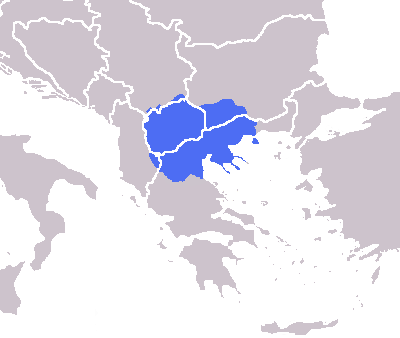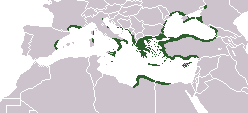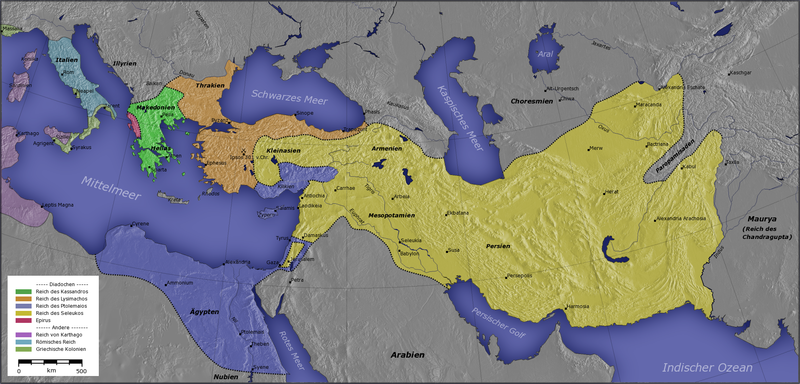Albania and FYROM don't really fit in this territory?
Maybe not all but some parts are if Ancient Macedonia is included.

Kingdom of Macedon on the eve of the Second Macedonian War, circa 200 BC.
http://en.wikipedia.org/wiki/Ancient_Greece
The Greek world in the mid 6th century BC.

Greek cities & colonies circa 550 BC.
http://en.wikipedia.org/wiki/Slavic_peoples
The "
Sklavinias" in the Balkans, 7th - 8th centuries

All Sklavinias disappeared?
http://en.wikipedia.org/wiki/Macedonia_(region)

Modern Macedonia is
divided by the national boundaries of
Greece (
Greek Macedonia), the
Republic of Macedonia,
Bulgaria (
Blagoevgrad Province),
Albania (
Mala Prespa and Golo Brdo),
Serbia (
Prohor Pčinjski and
Gora).
As seen on map Sklavinia in Macedonia (map 1913) and Greece, is not Bulgarian or Serbian.
http://en.wikipedia.org/wiki/Y-DNA_haplogroups_by_ethnic_groups
Y-DNA haplogroups by ethnic groups
Listed here are notable
ethnic groups by
Y-DNA haplogroups based on relevant studies. The data is presented in two columns for each haplogroup with the first being the sample size (
n) and the second the percentage in the haplogroup designated by the column header. The samples are taken from individuals identified with the ethnic and linguistic designations in the first two columns.
E1b1b
Albania: 21.6% & 25.5% (2 tests)
Kosovo: 47.4%
Greece: 20.8%, 23.8% & 31.6% (3 tests)
Macedonia (FYROM): 24.1%
Bulgaria: 20.7%
Serbia: 21.2%
Egypt: 43.5%
http://clyde.winters.tripod.com/chapter6.html
THE BLACK GREEKS
To deny the African origin of Grecian civilization the Eurocentrists attack Martin Bernal's book:
Black Athena. This book has nothing to do with Afrocentrism. In the two volumes published thus far, Bernal maintains that Semites from Phoenicia and the Semitic Hyksos speaking rulers of Egypt, took civilization to Greece, not Black Africans.
J.A. Rogers in
Sex and Race, Parker, Diop and DuBois on the other hand, are Afrocentric scholars. These scholars have reviewed the writings of the classical authors, the anthropological, linguistic and historical evidence to reach the conclusion that the ancient Greeks were blacks and that the European Greeks learned the liberal arts and sciences from their "black ancestors" who first settled Greece and the Egyptians.
According to the Olympian Creation Myth the earliest groups to appear on earth were the Libyco-Thracians .The Libyans were Proto-Saharans, as were the original Thracians. Some Thracians were descendants of the Kushite and Egyptian troops established at Trace, by Sesostris (Thutmose III or Ramses II), when he conquered Asia and Europe.(Diop 1991; Winters 1983a,1984b,1985a)
Many of the so-called Greek myths are in reality historical texts which show the ancient lifestyle of the pre-Aryans in Greece and the transition from Pelasgian matriarchy to Greek-Aryan patriarchy. The term
Amazon was often used by the Aryans to denote matriarchal societies living on the Black Sea. The battle between Thesus and the Amazons, led by Queen Melanippe, records the conflicts between the ancient Aryan-Greeks and the Libyans settled around the Black Sea.
Dr. Lefkowitz (1992) and Snowden (1992,1976) perpetuate the myth that the only blacks in ancient Europe were slaves or mercenaries. This is false the Greek historical works make it clear that many ancient settlers of the Aegean came from Africa , especially the Garamantes and Pelasgians. G. W. Parker wrote that: "I need not go into details concerning the ethnical relations of the Romans, since they, too are Mediterranean and are closely related to the same African confederation of races ...[situated in Greece]. Aeneas, their mythical founder of Troy. The
Aenead, like the
Illiad, and
Odyssey and all other of the world's great epics, is the poetic story dealing with African people". The heroes of these tales used long shields, the characteristic shields of the Indo-European speaking Greeks were round.
The Eurocentrists attempt to prove there was "considerable cultural and linguistic continuity from the twelfth century to the eight century BC" ,in the Aegean . Yet there is no way it can be proven that Indo-European Greeks have always been in Greece. This view on the continuity between the Linear B Greeks and later Greeks held by Lefkowitz is disputed by Hopper who noted that " after all, so much which characterizes Minoan Crete seems wholly alien to later Greece, despite the efforts of scholars to detect 'continuity' " .
THE PELASGIANS
The Greeks often called the first inhabitants of Greece Pelasgians. The Greek writers claimed that
Pelasgus, the great ancestor of the Pelasgians was the first man. The Pelasgians were a combination of diverse Black tribes which included the Achaeans , Kadmeans, and Leleges. The Garamantes were also often called Pelasgians by some classical writers. Strabo said "that the Pelasgi, as indeed the most ancient nation, were diffused through all Greece, and especially among the Aeolians".
The city of Argo was founded by
Phoroneus, the father of Pelasgus, Iasus and Agenor. It was these folks who divided the Peloponnese between them.
Herodotus referred to the Pelasgians as "venerable ancestors". He said that the first Athenians "they were Pelasgi, the later possessing the country now designed Hellas". The Pelasgian founding of Athens is also noted by Plutarch in
Theseus 12, and Ovid in
Metamorphosis vii.402ff. According to Herodotus vii.91, the Pelasgians also founded Thebes in Europe. Pausanias, noted that "The Arcadians make mention of Pelasgus as the first person who existed in their country. From this king the whole region took the name Pilasgia". Hopper noted that the Pelasgians founded Attica.
The Black immigrants from Canaan were also settled in the Aegean at Argolis. They called themselves the "Sons of Abas". Many of the
Melampodes later took part of Argolis away from the Canaanites.
The earliest Greek alphabet was made by the Pelasgians, it was lost and later reintroduced by Kadmus to Boeotia. Another Pelasgian, Evander of Arcadia introduced writing to the Italians. This script was used to make the first fifteen characters of the Latin script according to Pliny and Plutarch.
EGYPTIANS
The Egyptians established many colonies in ancient Europe. The Egyptians called themselves
Melampodes or "Blackfeet". The Egyptians were also called
Danaans in Greek history. According to Hyainus in
Fabula, and Apollonius Rhodius when the Danaans came to Greece they were a combination of diverse African tribes.
When the Danaans came to Greece they took away part of Argolis from the Canaanites. The Danaans took the Mysteries of Themoporia and the oracle of Dodona to Greece. This view is supported by the discovery of an inscribed stone in the Peloponnese that had Egyptian writing on it dating to the Vth Dynasty of Egypt. Greek traditions speak of Egyptian colonies founded by
Cecrops who settled Atica,
Danaus the brother of
Aegyptus was the founder of Argolis. Danaus is alleged to have taught the Greeks agriculture and metallurgy.
MYCENEANS
The ancient Myceneans were Blacks. These ancient people came from Crete, and the Western Sahara. Alain Anselin has shown how many of these Myceneans spoke Dravidian languages especially the
Termils of Asia Minor.
The cities of Troy, Mycenae, Tiryns, Thebes and Orochomenos were founded by the
Eteocretans or "Real Minoans", as opposed to the later Greco-Cretans. These Eteocretans spoke a Manding language.
Achaeans
By 1200 BC, much of the Mycenae civilization was under the control the
Achaeans. The Achaeans later founded other city-states in Greece. After conquering the Mycenaeans, the Achaeans formed the Greek states of Peloponnesus. Their major cities: Mycenae and Tiryns in Argolis, and Pylos Messenia were originally founded by other Pelasgian groups.
When he says Greece he means Greece of the past and today?
What greeks are we talking about? Ancient and todays greeks are same since when?









